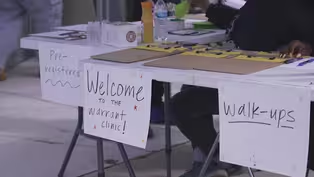
How new congressional maps will impact 2024 election
Clip: 10/26/2023 | 6m 45sVideo has Closed Captions
How new congressional maps in Georgia and North Carolina will impact 2024 election
House Speaker Mike Johnson will face the same struggle that plagued his predecessor, a narrow GOP majority. He will have to protect it in next year's elections and redistricting could complicate that. North Carolina has new congressional maps and a judge tossed out Georgia's maps. Amna Nawaz discussed more with Mark Niesse of the Atlanta Journal-Constitution and Rusty Jacobs of WUNC Public Radio.
Problems playing video? | Closed Captioning Feedback
Problems playing video? | Closed Captioning Feedback
Major corporate funding for the PBS News Hour is provided by BDO, BNSF, Consumer Cellular, American Cruise Lines, and Raymond James. Funding for the PBS NewsHour Weekend is provided by...

How new congressional maps will impact 2024 election
Clip: 10/26/2023 | 6m 45sVideo has Closed Captions
House Speaker Mike Johnson will face the same struggle that plagued his predecessor, a narrow GOP majority. He will have to protect it in next year's elections and redistricting could complicate that. North Carolina has new congressional maps and a judge tossed out Georgia's maps. Amna Nawaz discussed more with Mark Niesse of the Atlanta Journal-Constitution and Rusty Jacobs of WUNC Public Radio.
Problems playing video? | Closed Captioning Feedback
How to Watch PBS News Hour
PBS News Hour is available to stream on pbs.org and the free PBS App, available on iPhone, Apple TV, Android TV, Android smartphones, Amazon Fire TV, Amazon Fire Tablet, Roku, Samsung Smart TV, and Vizio.
Providing Support for PBS.org
Learn Moreabout PBS online sponsorshipAMNA NAWAZ: While Congress has resumed its regular work, new House Speaker Mike Johnson will soon face the same struggle that plagued his predecessor, a narrow Republican majority.
And he's got to protect that majority in next year's elections.
But two redistricting updates could complicate that 2024 political landscape.
North Carolina has approved new congressional maps, while a Georgia judge has tossed out that state's maps.
For the details, I'm joined by Mark Niesse of The Atlanta Journal-Constitution and Rusty Jacobs of WUNC Public Radio.
Gentlemen, welcome to you both.
And, Mark, let's start with Georgia.
So, tell us why the plaintiffs in this lawsuit argued that the map needed to be changed.
And tell us about the judge's decision.
MARK NIESSE, The Atlanta Journal-Constitution: What happened is, in Georgia two years ago, Georgia's political maps were redrawn because of the census.
And even though Black Georgians gained about 500,000 people in population, they lost representation in Congress.
And so the U.S. district judge, Steve Jones, ruled today that that violated the Voting Rights Act, which is meant to protect Black voter representation.
AMNA NAWAZ: And, in that ruling -- actually, I will pull out just a piece of it -- the judge wrote this, that: "The court reiterates that Georgia has made great strides since 1965 towards equality in voting.
However, the evidence before this court shows that Georgia has not reached the point where the political process has equal openness and equal opportunity for everyone."
So, Mark, they have until December 8 to draw a new map, I understand.
What happens now.
And, most importantly, what's the likely impact for Democrats and Republicans?
MARK NIESSE: What happens now is, Governor Brian Kemp ordered a special session to begin November 29.
So all of the Georgia General Assembly will return to Atlanta and vote on new maps to meet that December 8 deadline.
And the likely impact, if there is an additional district where Black voters make up a majority, that -- because Black voters overwhelmingly vote for Democrats, it is possible, and perhaps likely, that Democrats would gain a seat among Georgia's congressional delegation.
Currently, Georgia has nine Republicans and five Democrats in Congress.
And, before redistricting, it was eight Republicans to six Democrats.
So we might see a reversion to the previous way that Georgia was divided politically.
AMNA NAWAZ: Could be a big change in a key state there.
But let's turn to North Carolina as well.
Rusty, this week, the North Carolina legislation approved new congressional maps.
What changed on the map and what is the impact?
RUSTY JACOBS, WUNC: The impact is pretty clear to anybody who looks at the map that was approved.
And that is, you're going to go from a 7-7 split right now between Democrats and Republicans to at least a 10-4 advantage for Republicans.
Republicans in North Carolina have managed to do this year what they tried to do in 2021, drawing maps after the 2020 census numbers came in.
But, in 2022, the Democratic majority in the state Supreme Court at the time said Republicans went too far.
They drew maps, they gerrymandered the districts with excessive partisanship.
It was a landmark case, but it only lasted a year, until Republicans flipped the state Supreme Court majority in last year's midterms, revisited that partisan gerrymandering case, and have found that courts should play no role in policing partisan gerrymandering.
That pretty much gave Republican lawmakers the free rein they needed, and they now have maps that guarantee them at least 10 congressional seats for 2024.
AMNA NAWAZ: So, Rusty, there's essentially a few Democratic incumbents who are kind of written off the map in this new landscape.
One of them is a man named Wiley Nickel from the Raleigh area.
He posted his reaction to this on X, using some rather colorful language.
He said: "The maps are an extreme partisan gerrymander by Republican legislators that totally screw North Carolina voters.
It's time to sue the bastards" -- end quote.
Rusty, are these maps going to end up back in court?
RUSTY JACOBS: For sure.
I could say that without a doubt.
And I will say too, echoing what Mark was talking about, echoing what the U.S. Supreme Court said in this Alabama Milligan case that looked at the idea that the VRA, the Voting Rights Act, Section 2 is alive and well and meant to preserve voting power of high concentrations of Black communities, Black voters.
There are already claims that at least, in a state Senate map here in North Carolina, state Senate district, that Black communities are being sliced and diced in a way that dilutes their voting power.
So there are definitely legal claims being formulated right now.
AMNA NAWAZ: And, Rusty, to be clear, this is likely to be handled in the courts, right?
Even though there's a Democratic governor, there's no veto on this, right?
RUSTY JACOBS: Correct.
That is a quirk of North Carolina.
In fact, the governor now, the Democrat, Roy Cooper, was a leading legislator at the time that they enacted the governor's veto, but they left out redistricting.
Maps cannot be vetoed by governors.
AMNA NAWAZ: Mark, back to you.
If this is where the judge has decided things are now, how likely is this to just continue to be appealed?
And is there any precedent we have seen, if it makes it up to the Supreme Court, of how this might go?
MARK NIESSE: It seems very likely to me that it will be appealed.
But what we have seen from the U.S. Supreme Court case that Rusty just referenced in involving redistricting in Alabama, the Supreme Court let Alabama's redistricting stand and, in fact, rejected appeals from Alabama to try to not comply with lower court orders that would have changed Alabama's maps.
So, the Supreme Court has recently upheld the Voting Rights Act.
There will certainly be appeals.
And their action in Alabama isn't any guarantee that they would rule the same way in Georgia's case, but it's certainly possible.
That is the recent history of the Supreme Court, that they have upheld the protections of the Voting Rights Act that are meant to ensure Black representation.
AMNA NAWAZ: Two key states in Georgia and North Carolina we will be paying close attention to.
Thank you to you both for joining us today.
That is Mark Niesse of The Atlanta Journal-Constitution and Rusty Jacobs of WUNC.
Thank you.
MARK NIESSE: Great.
Thank you.
Artist turns work into love letters for her husband
Video has Closed Captions
Clip: 10/26/2023 | 5m 32s | Artist turns her work into love letters to husband fading into the fog of Alzheimer's (5m 32s)
The horrific task of identifying Hamas terror attack victims
Video has Closed Captions
Clip: 10/26/2023 | 5m 55s | The horrific task Israelis face in finding and identifying Hamas terror attack victims (5m 55s)
House gets back to work with new Speaker Mike Johnson
Video has Closed Captions
Clip: 10/26/2023 | 5m 20s | House of Representatives gets back to work with new Speaker Mike Johnson (5m 20s)
Manhunt expands for Maine gunman who killed at least 18
Video has Closed Captions
Clip: 10/26/2023 | 7m 11s | 'Never thought I’d grow up and get a bullet in my leg,' says 10-year-old victim in Maine (7m 11s)
UN official: 'Hell is settling in' as it struggles in Gaza
Video has Closed Captions
Clip: 10/26/2023 | 8m 58s | UN official warns 'hell is settling in' as it struggles with Gaza humanitarian crisis (8m 58s)
Warrant clinics take care of legal issues without jail time
Video has Closed Captions
Clip: 10/26/2023 | 7m 25s | Innovative warrant clinics help people take care of legal issues without risking jail time (7m 25s)
Providing Support for PBS.org
Learn Moreabout PBS online sponsorship
- News and Public Affairs

FRONTLINE is investigative journalism that questions, explains and changes our world.

- News and Public Affairs

Amanpour and Company features conversations with leaders and decision makers.












Support for PBS provided by:
Major corporate funding for the PBS News Hour is provided by BDO, BNSF, Consumer Cellular, American Cruise Lines, and Raymond James. Funding for the PBS NewsHour Weekend is provided by...





